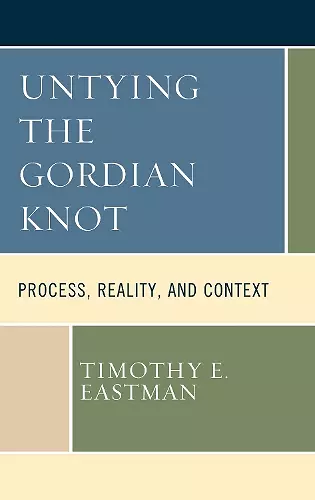Untying the Gordian Knot
Process, Reality, and Context
Format:Paperback
Publisher:Bloomsbury Publishing PLC
Published:11th May '22
Currently unavailable, and unfortunately no date known when it will be back
This paperback is available in another edition too:
- Hardback£108.00(9781793639165)

In Untying the Gordian Knot: Process, Reality, and Context, Timothy E. Eastman proposes a new creative synthesis, the Logoi framework—which is radically inclusive and incorporates both actuality and potentiality—to show how the fundamental notions of process, logic, and relations, woven with triads of input-output-context and quantum logical distinctions, can resolve a baker’s dozen of age-old philosophic problems. Further, Eastman leverages a century of advances in quantum physics and the Relational Realism interpretation pioneered by Michael Epperson and Elias Zafiris and augmented by the independent research of Ruth Kastner and Hans Primas to resolve long-standing issues in understanding quantum physics. Adding to this, Eastman makes use of advances in information and complex systems, semiotics, and process philosophy to show how multiple levels of context, combined with relations—including potential relations—both local and local-global, can provide a grounding for causation, emergence, and physical law. Finally, the Logoi framework goes beyond standard ways of knowing—that of context independence (science) and context focus (arts, humanities)—to demonstrate the inevitable role of ultimate context (meaning, spiritual dimension) as part of a transformative ecological vision, which is urgently needed in these times of human and environmental crises.
Timothy Eastman, eminent space scientist associated for many years with NASA and an important philosopher of science, has here produced a work of enormous significance. Cutting through a "Gordian Knot" of philosophical and scientific problems ranging widely from the mind-body issue, the nature of consciousness, freedom of the will, and the reality of temporal process, to the nature of quantum theory and the quantum measurement problem (to name a few), Eastman shows how an emphasis on physical context and employment of what he calls the relational logoi framework resolves such problems in a parsimonious and elegant way. The book displays astounding erudition producing a "consilience" of streams of evidence across numerous scientific and philosophical disciplines. Process philosophers and scholars working in the American pragmatist tradition will be especially drawn to this project as it resonates profoundly with central ideas found in Whitehead, Hartshorne, and Peirce. -- George W. Shields, University of Louisville
“We rightly marvel at the achievements yielded by the evolution of physics, from the Aristotelian paradigm to the mechanical paradigm to the field paradigm and finally to our current, stubbornly bipolar paradigm of quantum mechanics and relativity theory—that infamously double-edged instrument by which we define nature’s innermost and outermost extremes via mutually exclusive ontologies. This book charts a novel and compelling path forward toward a coherent relation of these incompatible fundamental theories—a path whereby nai¨ve object-oriented realism is redefined as inherently contextual and relational—a groundbreaking synthesis of the ideas of Peirce, James and Whitehead along with modern physics, complex systems, information theory, semiotics and philosophy.” -- Michael Epperson, California State University Sacramento
Timothy Eastman's book draws from and draws together many sources, from the humanistic to the scientific, inspired especially by the process philosophy of Whitehead and the semiotic vision of Pierce. Calling on these sources and inspirations, it presents an informed and informative synthesis in an integrative approach. It illuminates its fundamental notions of process, logic, and relations in a wide-ranging exploration; yet it is marked by a spirit which grants our fallibility, even as it proposes an ordered vision of things. It is engaging and illuminating in its impressive range of reference. Here we find a very thoughtful and synthetic voice that speaks in a constructive spirit. It witnesses to a new adventure of ideas, calling on the work of many thinkers who are cooperators in the field of constructive thought. Crossing boundaries between disciplines often kept apart, it is engaging and illuminating in its impressive range of reference. -- William Desmond, Katholieke Universiteit Leuven
ISBN: 9781793639189
Dimensions: 230mm x 156mm x 21mm
Weight: 562g
354 pages